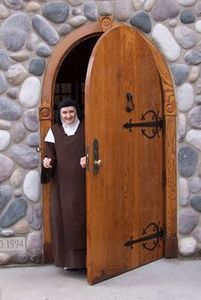“The Prior’s cell should stand near the entrance to your property, so that he may
be the first to meet those who approach, and whatever has to be done
in consequence may all be carried out as he may decide and order.”--the Rule, Chapter 9
be the first to meet those who approach, and whatever has to be done
in consequence may all be carried out as he may decide and order.”--the Rule, Chapter 9

I have heard this chapter described as a call for hospitality; that it is necessary for the Prior to be near the entrance so that he can better show and express a hospitable welcome to approaching guests. This is certainly within the spirit of the Rule and one way of looking at the text, but I also believe there is much more to glean form this chapter and the task of hospitality is but a smaller piece.
One of the first images that comes to mind in reading this chapter is that of a guard and protector. In the previous chapter, St. Albert had just described to us the importance for each brother to have his own, separate cell; these cells are to be assigned and situated according to the disposition of the Prior; the brothers can’t run around changing cells at a whim, nor can one brother decide to take the cell of another. One way of looking at this is that we are to have security in our cells. We are given security in our solitude to be absolutely free of unwanted and uninvited intrusions. It seems that Albert is placing a high value on this protected freedom, ensuring that the brothers can live the hermit life they have chosen. He is aware that pilgrims and visitors travel regularly through the land, and they have reasonable needs. By being at the entrance, the Prior is present to greet them and see to their needs of hospitality, allowing the brothers to continue their life of solitude and prayer without unnecessary disruptions and interference. The Prior, standing by the entrance, is a guard and protector of the sanctity of the solitary life, and in this way, is serving the brothers to meet their needs.
One of the first images that comes to mind in reading this chapter is that of a guard and protector. In the previous chapter, St. Albert had just described to us the importance for each brother to have his own, separate cell; these cells are to be assigned and situated according to the disposition of the Prior; the brothers can’t run around changing cells at a whim, nor can one brother decide to take the cell of another. One way of looking at this is that we are to have security in our cells. We are given security in our solitude to be absolutely free of unwanted and uninvited intrusions. It seems that Albert is placing a high value on this protected freedom, ensuring that the brothers can live the hermit life they have chosen. He is aware that pilgrims and visitors travel regularly through the land, and they have reasonable needs. By being at the entrance, the Prior is present to greet them and see to their needs of hospitality, allowing the brothers to continue their life of solitude and prayer without unnecessary disruptions and interference. The Prior, standing by the entrance, is a guard and protector of the sanctity of the solitary life, and in this way, is serving the brothers to meet their needs.

 RSS Feed
RSS Feed